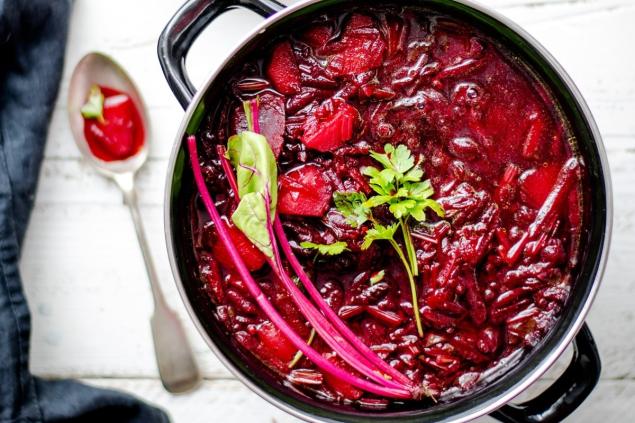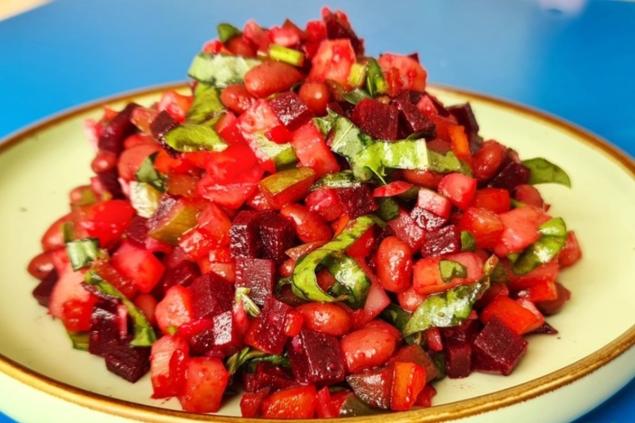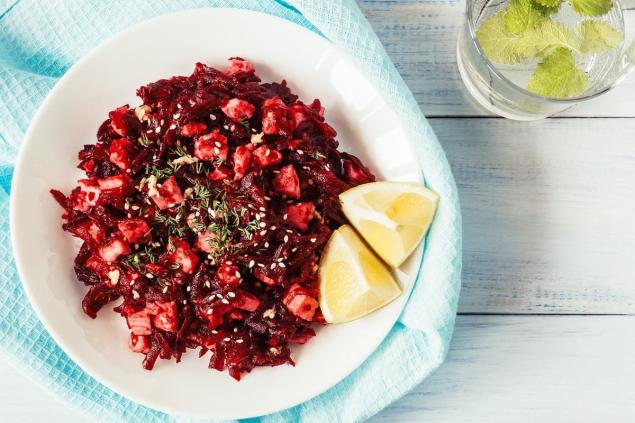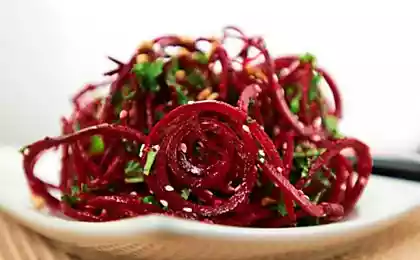162
I decided to surprise the family of her Argentine husband and prepared a vinaigrette for them, who knew it was a bad decision.
It turns out that it is quite difficult to find a dish with a richer history than a simple vinaigrette. I had no idea until I married an Argentine. I once cooked a full salad bowl during gatherings with friends - by the end of the evening the salad bowl was empty. What a surprise I was when I came home a couple of weeks later, and my husband, trying to impress me, Googled the recipe for that beet salad. He also looks at me and asks: “How to write correctly: vinaigrette or vinigret?” I'm just stunned.

We lived in Germany at that time, went to work (there and met). I had no idea that my husband and the Germans would like a vinaigrette. So I couldn’t wait to come to Argentina and present this outlandish dish at the first family dinner. But not here it was: the family members of the husband out of courtesy only picked a fork in the salad bowl. Why is that? Everything turned out to be even more interesting than I thought.
Vinaigrette or Vinaigrette: Why foreigners have such a complicated relationship with our beloved salad Of course, I was deeply offended by that incident at a family dinner. I tried so hard! Then she blamed herself for not preparing something more versatile for the first meeting. Now I remember this case with a smile: after 2 years, I know exactly which foreigners eat vinaigrette and which do not.
I was so caught up in this topic that I was not lazy and inquired about the history of the popular New Year's dish. Because it seemed to me that his name was not ours, overseas. It was doubly strange that no one had heard of him abroad. I was right about it: the name is not of Slavic origin.

Until the XVIII century, lean dishes in Slavic cuisine, despite their diversity, were presented very boring. Vegetables were served separately and hardly mixed with each other. Our forefathers were fans of food. This continued until French cuisine became fashionable. European chefs who came from afar, a little magic over boiled vegetables, added pickles to them and called the resulting dish vinaigrette.
In translation, the name means “sauce of vinegar and oil”. That vinaigrette gas station. And the godfather of the vinaigrette is considered Talleyram Antoine Karem - an outstanding cook who was invited to the imperial court in St. Petersburg. So the vinaigrette has French roots - it is a pity only, the French do not know about it. But probably Europeans love vinaigrette laid on the genetic level.

For example, in Germany, this salad is loved mainly because of beets. You will find it in any supermarket, boiled in advance and packed in a vacuum bag. In addition, in the region where the GDR once was, this dish is more familiar.
In Poland, beets are also loved, they sometimes sell beet water even in vending machines. Coffee, tea and beetroot water, such a soup that they also call borscht. They are happy, and our roots are close.

But in Argentina, beets are not favored. With the habit of its taste distinctly gives the earth, even in borsch it is clearly felt, just we rarely think about it. My husband liked it, but he traveled a lot and tried many dishes in his life. He likes almost everything, only okroshka did not like him very much - nevertheless, kefir is too specific for him.
Our sports friends from the United States, appreciated the vinaigrette in their own way. They noted that the combination of products is very good for health and is perfect for athletes. It is worth noting that beets are considered superfood. Unfortunately, few people know how to make beets delicious.

Povarenok Vinaigret in Italy shared her observations with her good friend, who also went to work, but to Italy. He says that Italians turn their noses to vinaigrette and do not understand how to eat it. The Macedonians are in full solidarity with the Italians. It is fair to say that this is how they relate to almost all dishes of the post-Soviet space. Neither Olivier nor, especially, the herring under the coat impress them. Many are terrified: how can you eat raw fish?
Probably because Italians have a very strong love for their cuisine, it is almost a religion. They do not tolerate innovation and are strongly attached to their traditional recipes. Italian cuisine is considered one of the best in the world. The friend also shared the suggestion: “Maybe it’s because you’re making a vinaigrette with beans?”

Povarenok Speaking of herring. Did you know that vinigrette itself is just a vegetable base? What is added to it is another matter. Vinaigrette is cooked with meat, fish, and poultry. Vinaigrette with herring even has its own name - walnut. To me, it's just a lazy fish under a fur coat.
The idea of vinaigrette is a combination of boiled and sauerkraut vegetables. Salted cucumbers (in some cases, they are replaced by sour cabbage) play a role. They compensate for the very earthy taste of beets. However, I looked to the Portuguese for another solution.

To remove the earthy taste, the Portuguese soak boiled beets in orange juice. Then it can be baked or crumbled into a salad - after pickling, it becomes quite tender and delicate. Now I'm thinking, should we make a second attempt? Perhaps my husband's family will change their minds if I add pickled beets and peas. I would like to make this salad for the New Year, because here in Argentina, I miss our cuisine.

We lived in Germany at that time, went to work (there and met). I had no idea that my husband and the Germans would like a vinaigrette. So I couldn’t wait to come to Argentina and present this outlandish dish at the first family dinner. But not here it was: the family members of the husband out of courtesy only picked a fork in the salad bowl. Why is that? Everything turned out to be even more interesting than I thought.
Vinaigrette or Vinaigrette: Why foreigners have such a complicated relationship with our beloved salad Of course, I was deeply offended by that incident at a family dinner. I tried so hard! Then she blamed herself for not preparing something more versatile for the first meeting. Now I remember this case with a smile: after 2 years, I know exactly which foreigners eat vinaigrette and which do not.
I was so caught up in this topic that I was not lazy and inquired about the history of the popular New Year's dish. Because it seemed to me that his name was not ours, overseas. It was doubly strange that no one had heard of him abroad. I was right about it: the name is not of Slavic origin.

Until the XVIII century, lean dishes in Slavic cuisine, despite their diversity, were presented very boring. Vegetables were served separately and hardly mixed with each other. Our forefathers were fans of food. This continued until French cuisine became fashionable. European chefs who came from afar, a little magic over boiled vegetables, added pickles to them and called the resulting dish vinaigrette.
In translation, the name means “sauce of vinegar and oil”. That vinaigrette gas station. And the godfather of the vinaigrette is considered Talleyram Antoine Karem - an outstanding cook who was invited to the imperial court in St. Petersburg. So the vinaigrette has French roots - it is a pity only, the French do not know about it. But probably Europeans love vinaigrette laid on the genetic level.

For example, in Germany, this salad is loved mainly because of beets. You will find it in any supermarket, boiled in advance and packed in a vacuum bag. In addition, in the region where the GDR once was, this dish is more familiar.
In Poland, beets are also loved, they sometimes sell beet water even in vending machines. Coffee, tea and beetroot water, such a soup that they also call borscht. They are happy, and our roots are close.

But in Argentina, beets are not favored. With the habit of its taste distinctly gives the earth, even in borsch it is clearly felt, just we rarely think about it. My husband liked it, but he traveled a lot and tried many dishes in his life. He likes almost everything, only okroshka did not like him very much - nevertheless, kefir is too specific for him.
Our sports friends from the United States, appreciated the vinaigrette in their own way. They noted that the combination of products is very good for health and is perfect for athletes. It is worth noting that beets are considered superfood. Unfortunately, few people know how to make beets delicious.

Povarenok Vinaigret in Italy shared her observations with her good friend, who also went to work, but to Italy. He says that Italians turn their noses to vinaigrette and do not understand how to eat it. The Macedonians are in full solidarity with the Italians. It is fair to say that this is how they relate to almost all dishes of the post-Soviet space. Neither Olivier nor, especially, the herring under the coat impress them. Many are terrified: how can you eat raw fish?
Probably because Italians have a very strong love for their cuisine, it is almost a religion. They do not tolerate innovation and are strongly attached to their traditional recipes. Italian cuisine is considered one of the best in the world. The friend also shared the suggestion: “Maybe it’s because you’re making a vinaigrette with beans?”

Povarenok Speaking of herring. Did you know that vinigrette itself is just a vegetable base? What is added to it is another matter. Vinaigrette is cooked with meat, fish, and poultry. Vinaigrette with herring even has its own name - walnut. To me, it's just a lazy fish under a fur coat.
The idea of vinaigrette is a combination of boiled and sauerkraut vegetables. Salted cucumbers (in some cases, they are replaced by sour cabbage) play a role. They compensate for the very earthy taste of beets. However, I looked to the Portuguese for another solution.

To remove the earthy taste, the Portuguese soak boiled beets in orange juice. Then it can be baked or crumbled into a salad - after pickling, it becomes quite tender and delicate. Now I'm thinking, should we make a second attempt? Perhaps my husband's family will change their minds if I add pickled beets and peas. I would like to make this salad for the New Year, because here in Argentina, I miss our cuisine.
Parents gave us a luxurious country house for the wedding, it would seem, what else to want, but my husband did not appreciate and left me.
How Alla Pugacheva is in Cyprus and why her last shopping ended in scandal























